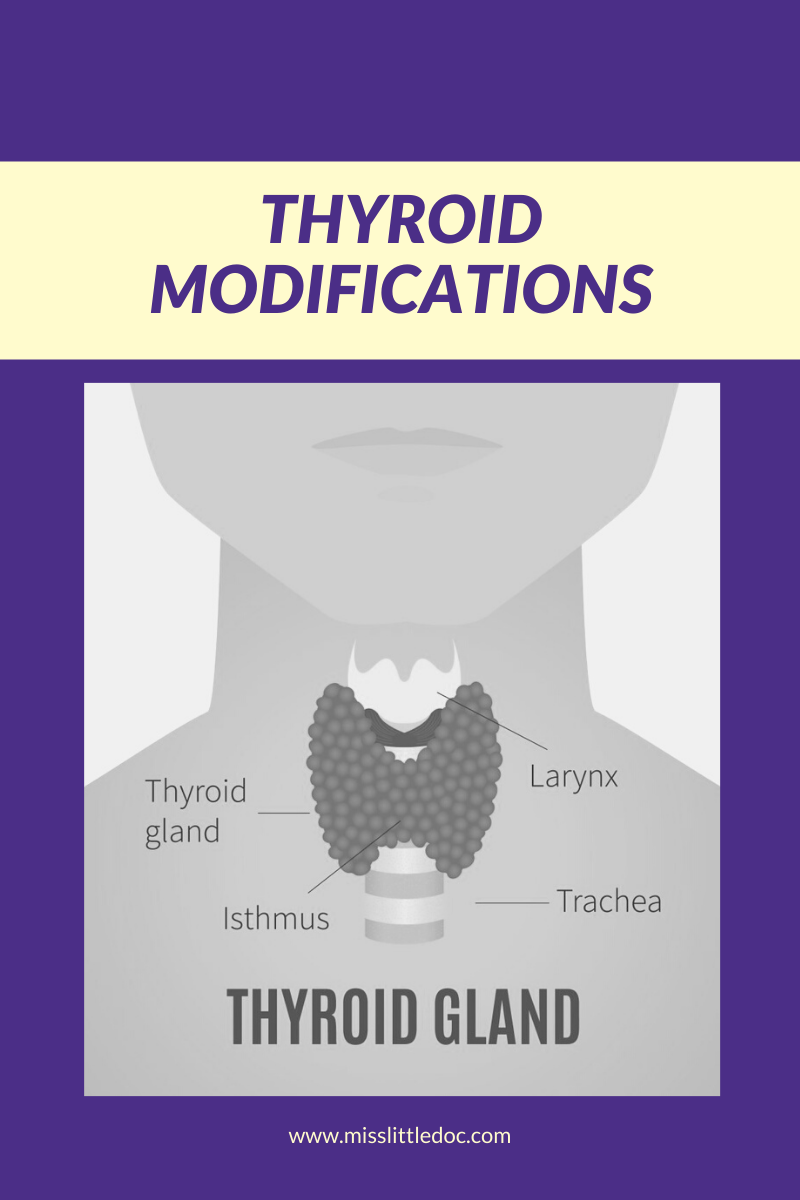Thyroid Modifications
I get asked all the time what people can do for their thyroid instead of taking a medication. Simple answer is change your diet! Longer answer is you really need to get all your blood work checked to see what all is being affected. I am in school for functional medicine at the moment and the more I learn the more it’s really basic. Blood work, diet, supplements, exercise, hydration and sleep. You literally are what you eat. Whatever you eat today will affect your body down the road. Smart choices will heal your body, bad choices will be detrimental to your body and cause inflammation, disease, and dysfunction.
The thyroid is a small gland located at the base of your neck, sometimes described as butterfly-shaped. The pituitary gland secretes thyroid stimulation hormone, which makes the thyroid produce thyroxine. When the thyroid isn’t acting properly it signals the brain to either produce more or less of TSH. Your thyroid is connected to every organ in your body and how it functions.
If you suspect you have a thyroid problem, it’s helpful to know the difference between hypothyroidism vs. hyperthyroidism symptoms so you can discuss what you’ve been experiencing. These symptoms are definitely not something to ignore and left untreated; a thyroid problem can get worse.
Hyperthyroid Symptoms
Symptoms of an overactive thyroid:
- Unintentional weight loss, even when your appetite and food intake stay the same or increase
- Irregular heartbeat, rapid heartbeat (more than 100 bpm) or palpitations
- Nervousness, anxiety and irritability
- Tremor (typically a fine trembling in your hands and fingers)
- Sweating and increased sensitivity to heat
- Change in menstrual cycle
- Changes in bowel patterns, especially more frequent bowel movements
- Fatigue, muscle weakness or difficulty sleeping
- Fine, brittle hair
Hypothyroid Symptoms
Symptoms of an underactive thyroid.
- Fatigue
- Muscle weakness, aches, tenderness and stiffness. Joint pain, stiffness or swelling
- Increased sensitivity to cold
- Constipation
- Dry skin
- Weight gain and puffy face
- Hoarseness
- Elevated blood cholesterol level
- Heavier than normal or irregular menstrual periods
- Thinning hair
- Slowed heart rate
- Depression

Let’s start simple for the thyroid.
- Remove all gluten. This is breads, pastas, crackers, cookies. Wheat, rye, spelt, barley.
- Increase anti-inflammatory foods and healthy fats: leafy green vegetables, fruits, coconut oil, butter, avocados, olive oil, eggs, nuts, seeds, and nut butters.
- Stay away from refined sugar, refined vegetable oil, cow’s milk, and unhealthy trans and saturated fats should be avoided in your diet because they promote inflammatory processes.
- Avoid soy products. Tofu, soy sauce, all things that have “soy” on the packaging.
- Limit caffeine and increase water. (About half your body weight in ounces of water daily.)
Good supplements to start off with can be a combination pill of the following or individual supplements. Make sure you buy from high quality brands. If they cost $5 at Walmart, they won’t have anything that’s good in them. Quality is very important. After all we are talking about getting you healthy!
- Find a good probiotic. Probiotic Bifidobacterium longum supplied with methimazole if possible.
- Magnesium
- Omega-3
- Vitamin A
- Vitamin D (I like K2-D3)
- Selenium
You also want to avoid fluoride (switch toothpaste to non-fluoride) and chlorinated water. And try to get 7/8 hours of sleep a night. If it’s hard to fall asleep, I like the supplement 3 Brains Sleep. It is natural herbs that are healthier for you than a melatonin or a sleeping pill.
Thyroid boosting food
Some of the best foods to support the thyroid are seaweed and sea vegetables, which contain iodine. Fish (especially sardines and salmon) contains iodine, omega-3 fats, and vitamin D. Dandelion, mustard, and other dark leafy greens that contain vitamin A. Smelt, herring, scallops, and Brazil nuts will contain selenium.
Things to try when supporting your adrenals, (which is connected to the health of your thyroid):
Adaptogenic herbs: Ashwagandha, Rhodiola Rosea, Holy Basil, and Eleuthero Ginseng can have a regulating effect on cortisol rhythm. Which directly affect your adrenals.
Magnesium: Works to help support the adrenal glands, relaxes stressed muscles and nerves, and promotes quality sleep.
Methylation support: Taking activated forms of B12 and folate are effective ways to support healthy methylation pathways, which help balance the melatonin-cortisol rhythm.
GABA support: GABA is your calming, inhibitory neurotransmitter and herbs like passion flower and amino acids such as theanine, glycine, and taurine can help calm you down by acting on the gabaminergic pathways in your brain.
Chiropractic
Keeping your body functioning with chiropractic care, keeps your organs, glands and tissues functioning at optimum. The spine encases the nervous system which controls all functions of the body. Adjusting the spine resets the brain, in turn making the body send out signals that are more appropriate.
Chiropractic care along with other options can help reduce symptoms of thyroid dysfunction. If you have any questions, give us or a chiropractor near you a call.
~Dr. Lacey~
Carder Chiropractic Clinic, INC.
El Reno, OK 73036



